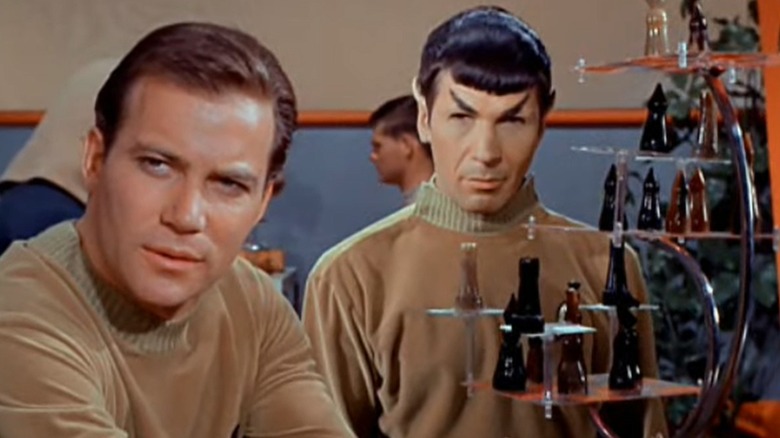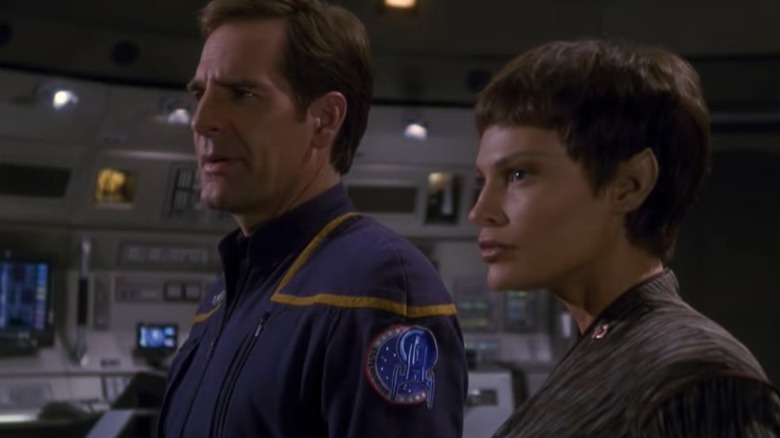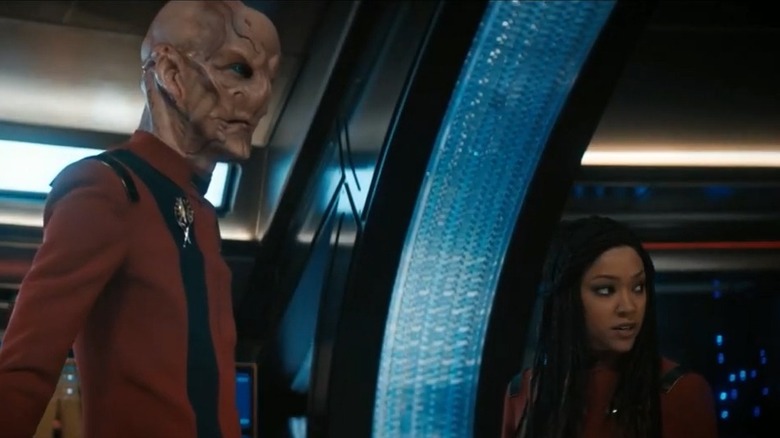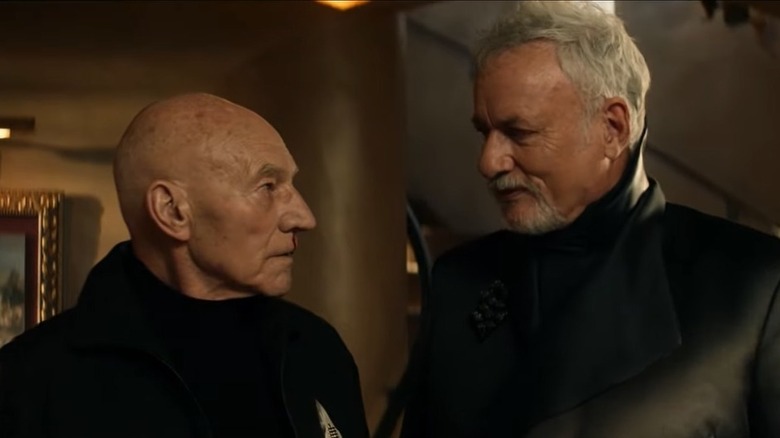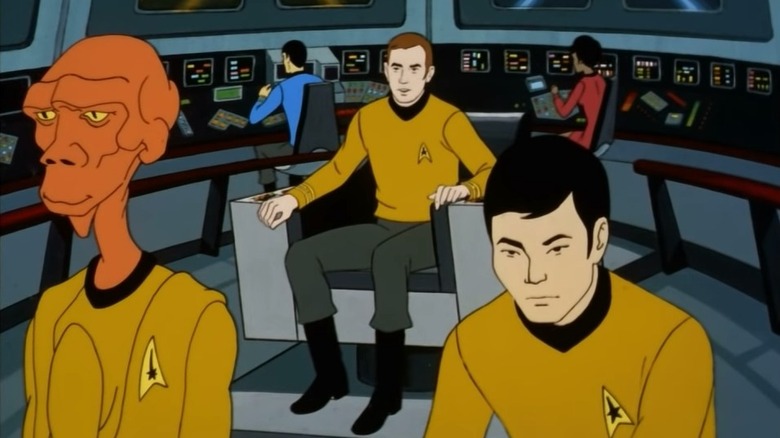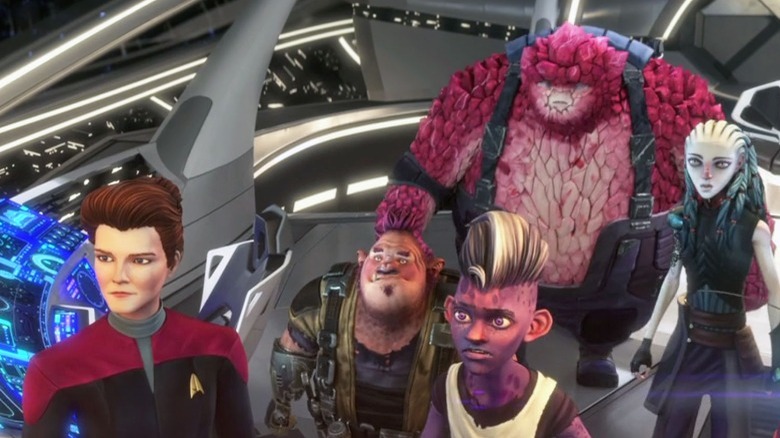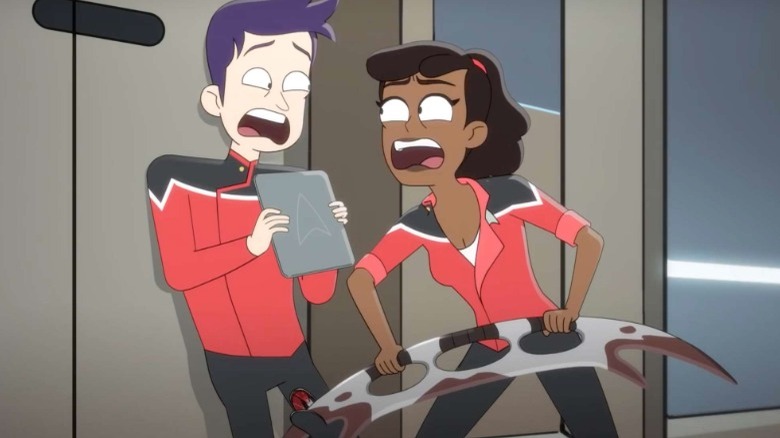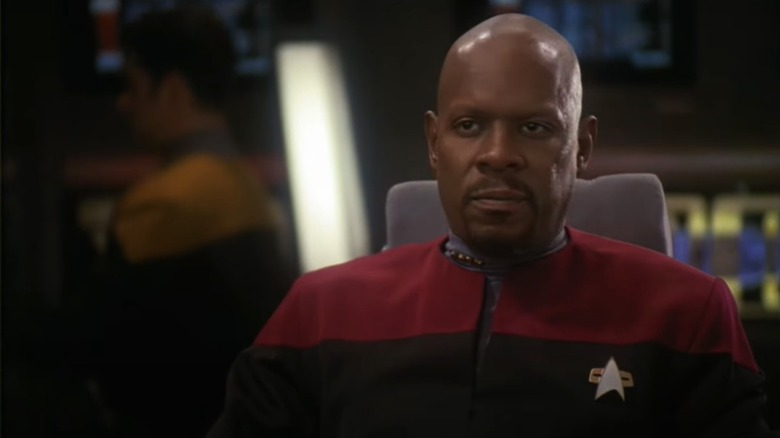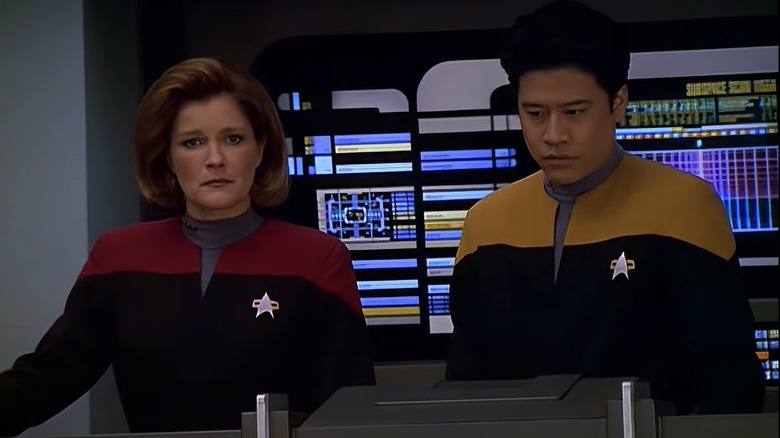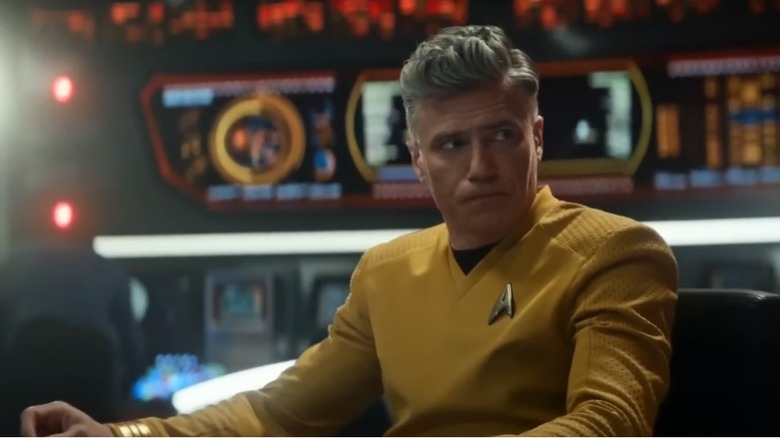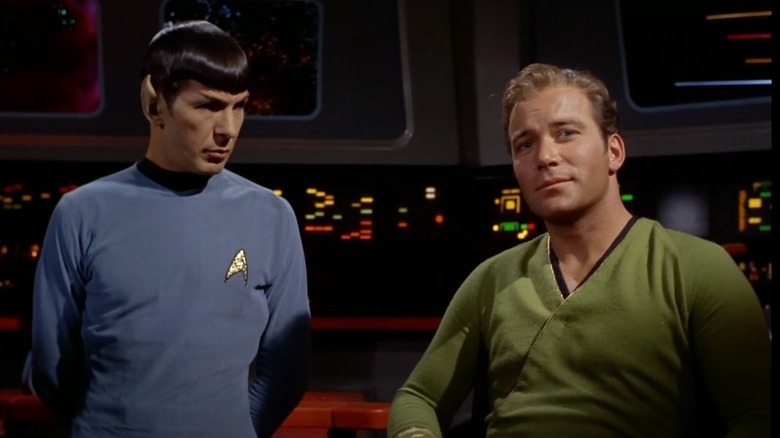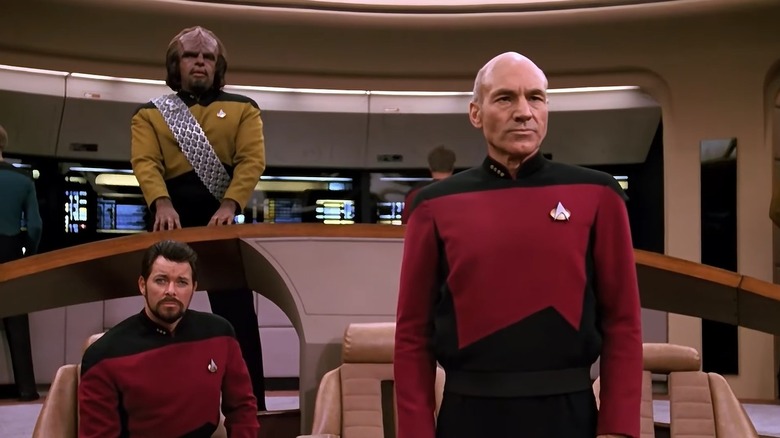Every Star Trek Series Ranked From Worst To Best
"Star Trek" is one of science fiction's big historical landmarks. It's the franchise that's inspired generations of scientists and engineers and gave Black girls and young Asian kids someone to look up to. It's a franchise about the courage it takes to explore the unknown, guided by a hopeful heart. The original series rarely shied away from tackling tough social issues, and it set about telling these stories with a ferocity that reminded us that we can always be better as a species. "Star Trek" reminds us that the bravery inside us isn't fiction and reaching out to explore will always be our brightest calling.
Since "Star Trek" premiered in 1966, there have been 13 films across multiple generations and timelines. More is on the way, with another J.J. Abrams-led film in preproduction, but for many fans, it's about the many TV series. They have the room to embody that spirit of hope and exploration — with 11 spinoffs to date. Little of "Trek" is objectively bad, but it can be divisive. This ranking is based on how the shows present the ideals of "Trek" and how well they accomplish some of the best things about the franchise.
11. Star Trek: Enterprise
"Enterprise" premiered in September 2001, four months after the USS Voyager and Trekkers were ready to return to the Alpha Quadrant. Captain Jonathan Archer, played by science fiction veteran Scott Bakula, was to helm the first Enterprise, NX-01, with its maiden launch pegged to 2151. Its two-part premiere, "Broken Bow," was set to be as mysterious and intriguing as "Encounter at Farpoint," introducing the Klingons in the canon chronology.
The trouble started as we were blown backward in our seats by the first "Star Trek" theme to have lyrics, "Faith of the Heart," a corny power ballad rebuilt from a Rod Stewart weepie that featured in one of Robin Williams' few bad films. The first season then limped its way through a mystery box time travel plot. Later seasons faced hurdles ranging from executive shakeups to the abrupt introduction of the Xindi, a new threat that tried to refocus the show but just made things muddier. Canceled as production on Season 4 was wrapping up, the unkindest cut was a limp finale that trudges out William Riker in a desperate bid to appease the fans. The spirit of "Star Trek" lived in the "Enterprise" cast, but the execution did not do them justice.
10. Star Trek: Discovery
"Discovery" returns to the pre-Kirk era, with the crew of the USS Discovery beginning its mission of exploration in 2256. Originally helmed by Bryan Fuller, the diverse cast is a welcome sight, and their passion for exploring "Trek" isn't in doubt. The first couple of seasons are sometimes a grim slog, and for long-time fans desperate to explore new worlds, it may be tiresome to watch Spock's legacy get trotted out over and over again. Equally frustrating is the revelation that ties Spock (Ethan Peck) and Michael Burnham (Sonequa Martin-Green) together.
As time goes by, "Discovery" developed a rhythm of its own. It's hard to knock a series that's evolved as strongly as this one and has brought legendary director David Cronenberg on board as a recurring guest. Its newer story arcs put the crew of the Discovery in a distant, ruined future with mysteries that pay off. Further, the earlier interpersonal bumps receive enough explanation to satisfy our initial misgivings. Best of all for the future of "Trek" was the introduction of a new Christopher Pike. Anson Mount went on to rebuild this small but important character into someone sturdy enough to helm one of the most promising new "Treks" in decades.
9. Star Trek: Picard
It personally hurts me to place "Picard" this low on the list, but two things weigh it down. The first is the reminder of the way this series is a hot potato among some "Trek" fans, with the show's subreddit often engaging in heated debate after new episodes. The other is that "Picard" isn't so much a "Star Trek" series as it is a rich exploration of a single fan-favorite character. The galaxy is on standby as we travel alongside the sort-of retired Jean-Luc Picard as he explores the consequences of Starfleet's past actions and his own.
The first season allows a fresh look at the Romulans, giving them some of the same treatment Klingons earned under Captain Picard in the '90s. Whatever one may think of the Borg-heavy plot, that exploration is a definite highlight. The second season is a tough look at mortality and the cycle of abuse, guided by the welcome presence of John de Lancie as Q. It's rugged and sometimes messy storytelling, but the emotional journey is worth it. Nonetheless, it's not the strongest "Trek" entry based on the merits of Starfleet's ideals, and we have to accept that.
8. Star Trek: The Animated Series
Remarkable for the time with its kid-friendly but serious storytelling, "The Animated Series" is functionally a fourth season of the original "Star Trek." The animated medium allows for some new characters and fascinating new species to take the fore, with the Caitian M'Ress joining the command deck. Though the animation is sometimes flat with noticeably recycled elements, the scripts retain their quality under "Star Trek" veteran and executive producer D.C. Fontana. The results were good enough to win an Emmy in 1975.
With the majority of the original cast returning, save for Walter Koenig despite Leonard Nimoy's best efforts, there's a lot of good "Trek" to be found under the hoary silliness. Some of these goofier storylines provide fodder for the teasing new series, "Lower Decks," especially the Walter Koenig-penned "The Infinite Vulcan" with its giant clone of Spock. It's not a bad story, but it is a wild ride to the edges of the franchise's believability. Nonetheless, the series is often an unexplored trove for classic fans who miss the old crew. Give this show a chance. It may surprise you.
7. Star Trek: Prodigy
We're only halfway through the first season of this delightful new show, and it's already a winner. With vibrant CGI animation showcasing its almost entirely alien cast of characters, it's a kid's show that understands that kids are way smarter, tougher, and more curious about the universe around us than we often realize. The return of Captain Janeway as an emergency guidance hologram doesn't overpower its cast of overwhelmed kids but instead provides the kind of support I wish all kids could have.
"Prodigy" mixes in a handful of anthological-style stories with a plot about a prison planet and its mysterious tyrant, the Vau N'Akat Diviner (John Noble). The planet's not above putting child slaves to hard labor, and they're overseen by Drednok (Jimmi Simpson), a robotic nightmare that reminds me that I watched "RoboCop" when I was way too young. The midway point leaves us nervous about the kids' first real encounter with Starfleet, but with the series already renewed, we can be assured there are going to be lots of new things for them to experience.
6. Star Trek: Lower Decks
We can make the case for "Lower Decks" as some of the very best new "Trek" the franchise has to offer. At the same time, the more "Trek" that you know and love, the better this show gets. This means that in terms of this list, it's a central pillar of the franchise, a sturdy construct that showcases so many of the things fans both love and sometimes find funny about "Star Trek."
With a tightly-paced 22-minute format that speed-runs the best of the "Next Generation" storytelling style, the lower decks of the USS Cerritos are a good place to ease new fans in. The Cerritos is a utility ship, meaning it's not glamorous enough to do the cool things flagships like the Enterprise do. Instead, we get a funny and often touching look at what it's like to just be some dude in Starfleet. As it turns out, that's far more important to Starfleet than we realize. The character dynamics are top-notch, and most important of all, "Lower Decks" is willing to take a look at the consequences of Starfleet's occasionally too-passive approach to new worlds and new civilizations.
5. Star Trek: Deep Space Nine
While the explorative angle of "Star Trek" is often pushed to the side by the immobile nature of the former Cardassian space station in orbit around Bajor, hope remains a feature of "Deep Space Nine," one of the oddest "Treks" to date. A little divisive at the time due to the major change of setting and its often somber nature, "Deep Space Nine" is a show that's aging better than that one Botox-loving relative you have to see every holiday.
"DS9" features a rock-solid cast willing and ready to explore the dark side of Starfleet's sunny utopia. The Bajoran star system feels like it's a universe away from the lush comforts of Risa and Betazed. A still-fragile world wears fresh scars under its new freedom, and even their faith is being undermined. Cardassians, the lizardlike species that nearly broke Captain Picard, remain a threat. As the series moves into longer story arcs with the rise of the Dominion, "Deep Space Nine" ensured it would forever be like no other "Trek." But that hope always lingers in the mysterious work of the Prophets, Chief O'Brien's unstoppable competency, and Kira Nerys' efforts to help uplift her people.
4. Star Trek: Voyager
Captain Kathryn Janeway was ahead of her time, embodying all the over-reviled toughness of Doctor Pulaski (Diana Muldaur) and adding a ferocious loyalty to her hodgepodge crew of Starfleet and Maquis exiles. The USS Voyager is flung deep into the Delta Quadrant, a virtually unknown region of space where just about every planet is a first contact world. Unfortunately, it also has the Borg. And sometimes Q shows up.
"Voyager" lays a lot of new ground for "Trek," allowing a larger exploration of the assimilation-lovin' cyborgs via Seven of Nine (Jeri Ryan). Though Seven gets a bit of the Troi effect, in that her initial bodysuit was some particular fan service, she comes into her own as one of "Trek's" best characters. Yes, the first couple of seasons are a little much. Pixie Kes is sometimes too twee, and then there's Neelix, who evokes the same exhaustion as an overabundance of Joe Pesci in "Lethal Weapon," but the evolving holographic Doctor, the wild freedom of untouched new worlds to explore, and the stubborn durability of the USS Voyager makes this a great show to revisit.
3. Star Trek: Strange New Worlds
There's some hubris in putting a brand new show this high on the list, but there's also a sense of relief around this series. From a command deck that reflects decades of new and updated special effects yet feels as rugged and simple as Kirk's old chair, to an opening theme that's the good ol' Alexander Courage theme buffed up a bit by composer Jeff Russo, this show is already proving itself to be the comfort food Trekkies need.
Anson Mount's casting as Christopher Pike may be one of the best things to come out of "Discovery," and he gives Pike both humanity and a heavy dignity. The premiere is talky — like Picard beaming down and scolding the hell out of everybody talky — with a reminder that "Trek," at its best, is always a mirror of the times we live in. A few personalities seem affronted that "Star Trek" is, once again, so forward thinking, so "liberal." They're missing the point. Pike is ready to lead his crew forward into the unknown to prove we can always be better. It's a true voyage home.
2. Star Trek: The Original Series
Without our grandpappy, none of us happy nerds would be here. Captain James T. Kirk, Science Officer Spock, Dr. McCoy, Uhuru, Chekov, Sulu, Scotty, and a host of allies and ever-disposable redshirts pioneered the exploration of strange new worlds and new civilizations. They boldly went where no one had gone before, and we've been following along for more than half a century.
From its premiere episode and throughout some tough times ("Spock's Brain" was a hell of a backhanded reward for a successful campaign to save the series), the original "Star Trek" was the light of science fiction, guiding the way for more stories, more experimental sci-fi, and a legion of diverse fans inspired by the bravery the crew of the USS Enterprise demonstrated in the face of an unknown galaxy. It's incomparable in some ways because it's the first, but age and social growth mean it's no longer No. 1. The franchise has looked back on its ancestor and demanded of itself to become even better.
1. Star Trek: The Next Generation
It's hard to do better than Jean-Luc Picard and the crew of the Enterprise-D, but the franchise should never stop trying. "The Next Generation" delivered exactly that, a generation of Starfleet captains now centuries out from Kirk's original mission but still dedicated to the promotion of diplomacy and peace across the galaxy. Unafraid to rely on complex dialogue when it counted yet full of the charm, humor, and nail-biting action of the original, the "Star Trek: The Next Generation" came into its own by the end of the second season. Even the first season is merely rugged in places. The intent to create something special was already plain.
It's a series that mixes thoughtfulness with an optimism that is never mindless. "It is possible to commit no mistakes and still lose," says Picard in "Peak Performance," a second season episode. "That is no weakness. That is life."
Like its ancestor, there's often an ageless quality to its episodes. The footage goes grainy and the props look like styrofoam on today's high-def screens, but the stories still matter. With "Star Trek," the stories have always mattered. They're reflections on the hopes Gene Roddenberry had for humanity.
